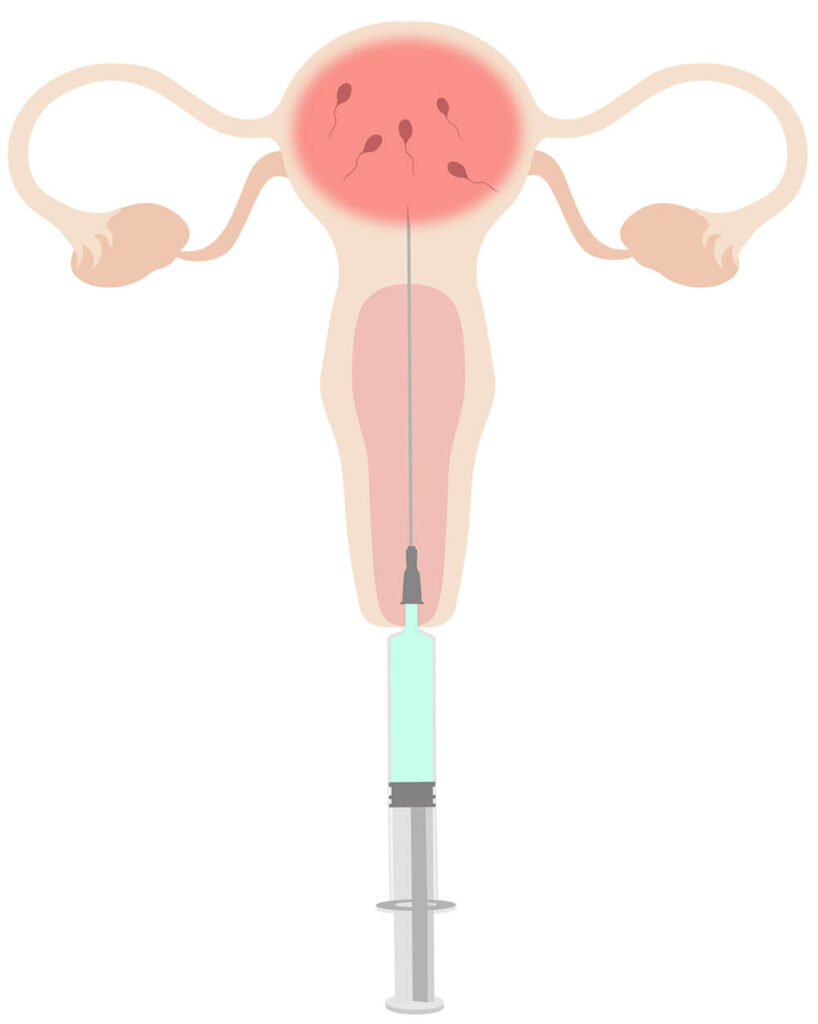Treatment Options
Intrauterine Insemination (IUI)
What is Intrauterine Insemination (IUI)?
Intrauterine insemination (IUI), also known as artificial insemination, is a procedure where sperm is placed directly into the uterine cavity through a catheter near the time of ovulation. IUI increases your chances of pregnancy as the sperm is placed directly into the uterus, lessening the distance sperm must travel by bypassing the cervix and improving the delivery of the sperm to the egg.

How does Intrauterine Insemination work?
-
IUI Preparation
IUIs can be performed either with the partner’s sperm or with donor sperm. It is recommended that the patient abstain from sexual intercourse for two to three days before the procedure. IUI is typically performed during the ovulation cycle. In some cases, it may be necessary for the female to take medication to induce ovulation if her cycles are not regular.
-
Semen Analysis
The male will provide a semen sample one to two hours before the procedure is to be performed. The semen will be washed, a procedure in which the sperm is separated from the seminal fluid, and the quality of the sperm is analyzed. Sperm preparation is performed in our laboratory by highly trained andrologists, who utilize meticulous specimen handling and quality control measures to ensure safety.
-
Insemination
Following the wash is the insemination procedure, which only takes a few minutes and does not cause much, if any, discomfort for the female. The doctor will insert a small catheter into the uterine cavity through the cervix and inject sperm directly into the uterus.
-
Post-Insemination
Following the insemination process, the patient is able to resume normal activity after lying down for a few minutes. If pregnancy does not result from the initial IUI, the procedure may be repeated during the following cycles.
Should I consider Intrauterine Insemination?
Intrauterine insemination (IUI) is a procedure that is commonly recommended for those who are struggling with infertility. IUI is a thoughtful option to explore when addressing male fertility issues. This procedure is often recommended when encountering challenges with sperm health, such as low sperm count or poor motility, or when there is a compatibility issue between the sperm and cervical mucus. Additionally, it can help overcome obstacles arising from difficulty in ejaculating inside the vagina due to conditions like erectile dysfunction, premature ejaculation, or other medical concerns.
Low Sperm Count or Poor Motility
During IUI, sperm is collected, processed, and concentrated. This concentration increases the number of motile (actively moving) sperm available for fertilization. Directly placing sperm in the uterus reduces the distance they must swim to reach the egg, increasing the likelihood of fertilization, even with a low initial sperm count.
Cervical Mucus Incompatibility
Cervical mucus incompatibility is when cervical fluid is not compatible with your partner’s sperm. Because of this incompatibility, the sperm is placed directly into the uterus, bypassing the cervix. By inseminating past the cervix, the sperm does not come in contact with the cervical mucus, and the chances of the sperm fertilizing an egg are increased.
Other Conditions
If there are medical conditions preventing ejaculation, there are procedures like Testicular Sperm Aspiration (TESA), Percutaneous Epididymal Sperm Aspiration (PESA), Microsurgical Epididymal Sperm Aspiration (MESA), or Testicular Sperm Extraction (TESE) that can be performed for sperm retrieval. Once the sperm is retrieved, it will be washed and ready for insemination.
Frequently Asked Questions (FAQs)
Intrauterine Insemination (IUI) is generally a pain-free procedure. Some patients may experience slight cramping and spotting, but the majority of patients do not experience any discomfort.
After IUI, we recommend waiting at least 14 days before taking a pregnancy test to ensure an accurate result.
After the procedure, you’ll be instructed to lie down for a few minutes and then you can resume your regular day-to-day activities.
Sexual intercourse after IUI will not affect your chances. After IUI, you should be able to go back to your regular daily activities.

